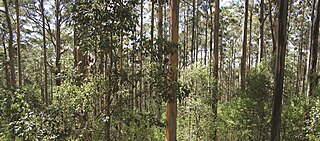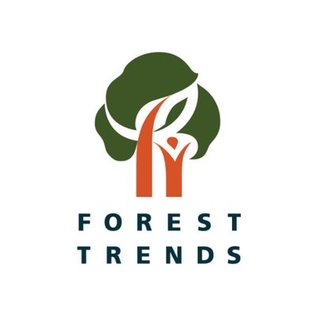
Environmental laws are laws that protect the environment. Environmental law is the collection of laws, regulations, agreements and common law that governs how humans interact with their environment. This includes environmental regulations; laws governing management of natural resources, such as forests, minerals, or fisheries; and related topics such as environmental impact assessments.Environmental law is seen as the body of laws concerned with the protection of living things from the harm that human activity may immediately or eventually cause to them or their species, either directly or to the media and the habits on which they depend.

The Food and Agriculture Organization of the United Nations (FAO) is a specialized agency of the United Nations that leads international efforts to defeat hunger and improve nutrition and food security. Its Latin motto, fiat panis, translates to "let there be bread". It was founded on 16 October 1945.

Forestry is the science and craft of creating, managing, planting, using, conserving and repairing forests and woodlands for associated resources for human and environmental benefits. Forestry is practiced in plantations and natural stands. The science of forestry has elements that belong to the biological, physical, social, political and managerial sciences. Forest management plays an essential role in the creation and modification of habitats and affects ecosystem services provisioning.

Illegal logging is the harvest, transportation, purchase, or sale of timber in violation of laws. The harvesting procedure itself may be illegal, including using corrupt means to gain access to forests; extraction without permission, or from a protected area; the cutting down of protected species; or the extraction of timber in excess of agreed limits. Illegal logging is a driving force for a number of environmental issues such as deforestation, soil erosion and biodiversity loss which can drive larger-scale environmental crises such as climate change and other forms of environmental degradation.

The Forest Stewardship Council GmbH (FSC) is an international non-profit, multistakeholder organization established in 1993 that promotes responsible management of the world's forests via timber certification. This organization uses a market-based approach to transnational environmental policy.

Certified wood and paper products come from responsibly managed forests – as defined by a particular standard. With third-party forest certification, an independent standards setting organization (SSO) develops standards for good forest management, and independent auditing companies issue certificates to forest operations that comply with those standards.

The Programme for the Endorsement of Forest Certification (PEFC) is an international, non-profit, non-governmental organization which promotes sustainable forest management through independent third party certification. It is considered the certification system of choice for small forest owners.

Sustainable forest management (SFM) is the management of forests according to the principles of sustainable development. Sustainable forest management has to keep the balance between three main pillars: ecological, economic and socio-cultural. Sustainable forestry can seem contradicting to some individuals as the act of logging trees is not sustainable. However, the goal of sustainable forestry is to allow for a balance to be found between ethical forestry and maintaining biodiversity through the means of maintaining natural patterns of disturbance and regeneration. The forestry industry mitigates climate change by boosting carbon storage in growing trees and soils and improving the sustainable supply of renewable raw materials via sustainable forest management. Successfully achieving sustainable forest management will provide integrated benefits to all, ranging from safeguarding local livelihoods to protecting biodiversity and ecosystems provided by forests, reducing rural poverty and mitigating some of the effects of climate change. Forest conservation is essential to stop climate change.
Analog forestry is an approach to ecosystem restoration that considers the process of forest formation and the functioning of forest services to be critical in establishing a sustainable ecosystem characterised by a high biodiversity to biomass ratio. Analogue forestry uses a synthesis of traditional and scientific knowledge to optimize the productive potential of the restoration design rather than maximise the production of one crop, and maximise ecosystem services by increasing the volumetric mass of the photosynthetic component.
The following outline is provided as an overview of and guide to forestry:

The American Tree Farm System (ATFS) is the largest and oldest woodland certification system in America. It is internationally recognized by the Programme for the Endorsement of Forest Certification and meets strict third-party certification standards. It is one of three certification systems currently recognized in the United States. ATFS specializes in certifying private forests, primarily those held by individuals and families and currently certifies over 24 million acres (110,000 km²) of forestland. The ATFS Standard for Certification is owned by the American Forest Foundation, a national nonprofit organization focused on promoting sustainable stewardship of America's woodlands and related environmental education through Project Learning Tree.

The Sustainable Forestry Initiative (SFI) is a sustainability organization operating in the U.S. and Canada that works across four pillars: standards, conservation, community, and education. The SFI was founded in 1994 by the American Forest & Paper Association (AF&PA). SFI is the world's largest single forest certification standard by area. SFI is headquartered in Ottawa and Washington, D.C.

Deforestation in Cambodia has increased in recent years. Cambodia is one of the world's most forest endowed countries, that was not historically widely deforested. However, massive deforestation for economic development threatens its forests and ecosystems. As of 2015, the country has one of the highest rates of deforestation in the world.

The Forest Products Commission (FPC) is a Western Australian Government trading enterprise established under an Act of Parliament, responsible for the development and marketing of the state's renewable timber resources. The agency was established as part of the then-Court Government's response to the debate regarding logging in old-growth forests. The minister responsible for the agency is the Minister for Forestry, currently Jackie Jarvis of the Labor Party.

The International Day of Forests was established on the 21st day of March, by resolution of the United Nations General Assembly on November 28, 2013. Each year, various events celebrate and raise awareness of the importance of all types of forests, and trees outside forests, for the benefit of current and future generations. Countries are encouraged to undertake efforts to organize local, national, and international activities involving forests and trees, such as tree planting campaigns, on International Day of Forests. The Secretariat of the United Nations Forum on Forests, in collaboration with the Food and Agriculture Organization, facilitates the implementation of such events in collaboration with governments, the Collaborative Partnership on Forests, and international, regional and subregional organizations. International Day of Forests was observed for the first time on March 21, 2013.
Sustainability standards and certifications are voluntary guidelines used by producers, manufacturers, traders, retailers, and service providers to demonstrate their commitment to good environmental, social, ethical, and food safety practices. There are over 400 such standards across the world.

Forest Trends is a non-profit organization founded in 1998 and based in Washington, DC, that connects with economic tools and incentives for maintaining ecosystems. Its mission is four-fold: to expand the value of forests to society, to promote sustainable forest management and conservation by creating and capturing market values for ecosystem services, to support innovative projects and companies that are developing these markets and to enhance the livelihoods of local communities living in and around those forests.
Sustainable products are those products that provide environmental, social and economic benefits while protecting public health and environment over their whole life cycle, from the extraction of raw materials until the final disposal.
Environmental certification is a form of environmental regulation and development where a company can voluntarily choose to comply with predefined processes or objectives set forth by the certification service. Most certification services have a logo which can be applied to products certified under their standards. This is seen as a form of corporate social responsibility allowing companies to address their obligation to minimise the harmful impacts to the environment by voluntarily following a set of externally set and measured objectives.

The Non-Timber Forest Products – Exchange Programme(NTFP-EP) is a network of non-governmental organizations and community-based organizations in Southeast Asia and South Asia that promotes the use of non-timber forest products (NTFPs) for forest conservation and as a source of livelihood for forest-based communities. The network has a regional secretariat office in the Philippines with country-level offices in Cambodia, India, Indonesia, Malaysia, the Philippines, and Vietnam.














